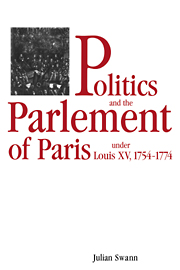Book contents
- Frontmatter
- Contents
- Dedication
- Preface
- List of abbreviations
- 1 Introduction: the Parlement of Paris
- 2 Historians and the parlements
- 3 The king and his judges
- 4 The parti janséniste and the refusal of the sacraments crisis, 1754–1756
- 5 Managing the parlements: crisis and compromise, 1756–1758
- 6 The Parlement and fiscal politics, 1756–1763
- 7 Choiseul and the politics of appeasement, 1758–1763
- 8 An unhappy peace, 1763
- 9 Defending La Chalotais: the Brittany affair, 1764–1766
- 10 In the eye of the storm, 1767–1770
- 11 The fall of the Parlement of Paris, 1770–1771
- 12 Conclusion: Maupeou and beyond
- Bibliography
- Index
12 - Conclusion: Maupeou and beyond
Published online by Cambridge University Press: 13 March 2010
- Frontmatter
- Contents
- Dedication
- Preface
- List of abbreviations
- 1 Introduction: the Parlement of Paris
- 2 Historians and the parlements
- 3 The king and his judges
- 4 The parti janséniste and the refusal of the sacraments crisis, 1754–1756
- 5 Managing the parlements: crisis and compromise, 1756–1758
- 6 The Parlement and fiscal politics, 1756–1763
- 7 Choiseul and the politics of appeasement, 1758–1763
- 8 An unhappy peace, 1763
- 9 Defending La Chalotais: the Brittany affair, 1764–1766
- 10 In the eye of the storm, 1767–1770
- 11 The fall of the Parlement of Paris, 1770–1771
- 12 Conclusion: Maupeou and beyond
- Bibliography
- Index
Summary
Between January and April 1771, Maupeou worked hard to replace the exiled Parlement of Paris. As an interim measure, the conseillers d'état and maîtres des requêtes of the king's council were drafted to replace the disgraced court. However, rather than create a second version of the Chambre Royale that had failed so abysmally during the exile of 1753–4, the chancellor embarked upon an ambitious plan of reform. Aided by, among others, Bourgeois de Boynes, Moreau, Bastard, and Lebrun, he prepared to form a completely new Parlement. In February 1771, the huge jurisdiction of the old Parlement was sharply reduced, with new courts of appeal, or Conseils Supérieurs, established in Arras, Blois, Châlonssur-Marne, Clermond-Ferrand, Lyon, and Poitiers. More remarkable was the daring and imaginative decision to abolish venality in these institutions and the reformed Parlement itself. The judges were to be appointed by the king to immovable, ennobling, but non-hereditary offices. Equally impressive was the announcement that in future justice was to be freely dispensed, ending the much criticised practice of épices that had done so much to bring the legal system into contempt. The judicial salary was henceforth to be paid wholly in the form of a gage, dependent upon the assiduity with which the incumbent fulfilled his duties. The new Parlement inherited the powers of registration and remonstrance of its predecessor, although under the restrictions contained in the disputed edict of December 1770. Remonstrances were, therefore, to be presented within two weeks of the court receiving a new law, and they could be repeated but not published, if required.
- Type
- Chapter
- Information
- Politics and the Parlement of Paris under Louis XV, 1754–1774 , pp. 352 - 368Publisher: Cambridge University PressPrint publication year: 1995

